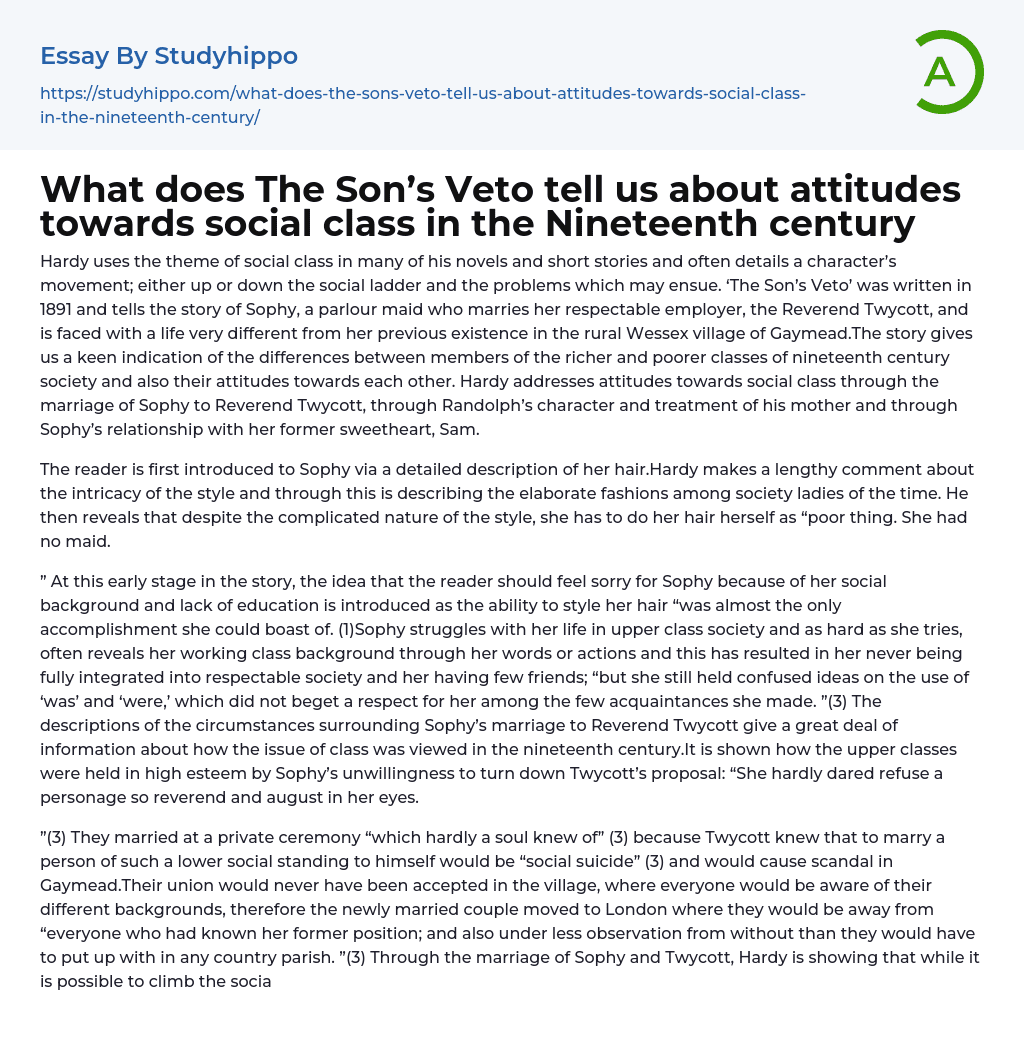

Social Class Struggles in Thomas Hardy’s ‘The Son’s Veto’
In many of his novels and short stories, Hardy explores the theme of social class and the challenges that arise as characters move up or down the societal ladder. Set in rural Wessex village of Gaymead in 1891, ‘The Son’s Veto’ follows Sophy, a former parlour maid who marries her employer, the Reverend Twycott. The story offers insight into the attitudes and differences between the richer and poorer classes of nineteenth century society. Through Sophy's marriage to Reverend Twycott, Randolph's treatment of his mother, and Sophy's relationship with her former sweetheart Sam, Hardy addresses social class attitudes.
The initial introduction to Sophy is a thorough portrayal of her hair, with Hardy providing an extensive commentary on the intricate style. This description serves to illustrate the complex trends prevalent among women in high society during the ti
...me. Moreover, Hardy discloses that despite the elaborate nature of her hairdo, Sophy had to manage it herself, since she lacked any domestic help.
The author introduces the idea that the reader should sympathize with Sophy due to her social background and lack of education, which is exemplified by her hair styling being her only accomplishment (1). Although Sophy tries her best to blend in with upper class society, she often reveals her working class roots through her behavior and speech, resulting in a lack of integration and few friends. This is demonstrated by her confusion with grammar rules, which causes her to lose respect among acquaintances (3). The circumstances surrounding Sophy’s marriage to the Reverend Twycott reveal the societal views on class during the nineteenth century. Sophy feels compelled to accept Twycott’s proposal due to his high standin
and importance in her eyes.
According to (3), Twycott and Sophy got married in a secret ceremony because Twycott knew that their marriage would be unacceptable in Gaymead and would cause scandal due to their different social standings. Moving to London was necessary to distance themselves from the disapproval of their community. Hardy's depiction of Sophy and Twycott's marriage highlights the idea that social mobility can be achieved, but a person's origins cannot be hidden completely. Despite Twycott's attempts to educate Sophy in the ways of society, she still lacked refinement as a lady.
According to the text, Sophy's relationship with her son Randolph highlights the theme of social class differences. Despite being privately educated and having a gentlemanly demeanor, Randolph treats his mother with disrespect and is ashamed of her background. After his father's death, he distances himself from Sophy and cares only about his own reputation as a gentleman. Randolph shows no concern for Sophy's happiness and would have been accepting of her remarrying if her suitor came from a higher social class. The text also highlights how Randolph corrects his mother's grammar and treats her as if she were a child.
Despite Sophy's love for Samuel Hobsen, her son Randolph refused to give permission for their marriage due to Samuel being a working-class man. Randolph's disdain for the lower classes was so strong that he would rather sacrifice his own mother's happiness than have a stepfather who was not a gentleman. Thomas Hardy vividly depicts the luxurious lifestyle of the upper classes through Randolph's attendance at a cricket match, where he describes rows of coaches piled high with remnants of extravagant lunches, including
bones, pie-crusts, champagne bottles, glasses, plates, napkins, and family silverware. Although Sophy longed to return to the village where she grew up and live happily with Samuel, Randolph had no regard for her sacrifice and forced her to take an oath not to marry.
In contrast to Randolph's attitude, Hardy portrays Sam as having a much greater respect for Sophy. While Randolph is unable to see beyond Sophy's lower-class background, Sam recognizes that hard work can elevate someone in society. He aspires to become a master greengrocer so he can provide a respectable home for Sophy, saying, "I'd keep you as genteel as ever I could, dear Sophy" (6). The tragic irony is that by the end of the story, Sam has achieved the respectable position in society that would have eliminated Randolph's objections to his mother's marriage. However, it is too late for him to marry Sophy as she has already died alone and forgotten.
Hardy's ‘The Son’s Veto’ uses its characters and narrative to demonstrate the upper classes' disdain towards the working class. The upper class only tolerates them as employees like maids and servants. Despite social aspirations, members of the working class, like Sophy, cannot break down class boundaries and are never truly accepted by those around them. They cannot escape their backgrounds. Sophy's tragic life shows that in the nineteenth century, a person's opportunities and attitudes from others were significantly impacted by their social class.
- Attitude essays
- Goals essays
- Personal Goals essays
- Personal Life essays
- Personality essays
- Principles essays
- Reputation essays
- Self Awareness essays
- Self Esteem essays
- Self Reflection essays
- Self Reliance essays
- Strengths essays
- Value essays
- Values essays
- Weakness essays
- Who Am I essays
- Adoption essays
- Aunt essays
- Babies essays
- Bedroom essays
- Caring essays
- Children essays
- Daughter essays
- Divorce essays
- Dog essays
- Dysfunctional Family essays
- Family Tradition essays
- Family Values essays
- Father essays
- Foster Care essays
- Friends essays
- Grandparent essays
- Home essays
- Hometown essays
- Husband essays
- Jealousy essays
- Love essays
- Marriage essays
- Mother essays
- Online Dating essays
- Parenting essays
- Parenting Teens essays
- Parents essays
- Relationship essays
- Room essays
- Sibling essays
- Sister essays
- Wedding essays
- Wife essays
- Anthropology essays



